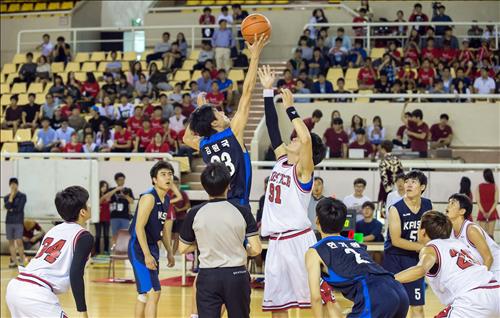event
The 14th POSTECH (Pohang University of Science and Technology) and KAIST Science War took place at the KAIST campus in Daejeon on September 18-19, 2015.
Students from both universities participated in the two-day sports and science event.
The Science War has been held every September since 2002 to encourage interaction among students of the two schools. Following the rule that puts the hosting school second in the title, this year it is called the “POSTECH-KAIST War.”
The competition consists of seven events: hacking, a science quiz bowl and AI (artificial intelligence) for the science section, LOL (League of Legends) for the e-Sports section, and lastly, baseball, basketball and football for the sports section.
Of the seven events, the school that wins four or more events is declared the winner. Thus far, KAIST has had seven wins and five losses.
In addition, the cheering squads and clubs of both schools participated. They were KAIST’s ELKA, Twilight, Infinite, and MindFreak, as well as POSTECH’s Cheero, Bremen, Stiller, and P-Funk perform.

-
event <Big Coins> Exhibition: Where Coins and Imagination Collide - Held at SUPEX Hall, KAIST Seoul Campus
KAIST (President Kwang-Hyung Lee) announced on May 19th the opening of the solo exhibition, “Big Coins,” by photographer and media artist Hojun Ji (Adjunct Professor, Department of Industrial Design) at the SUPEX Hall in the Business School of the Seoul Campus. The exhibition will run from May 19th to the end of February of the following year. This exhibition at the KAIST Seoul Campus Business School presents artworks with an insightful perspective, inviting diverse interpretations
2025-05-20 -
research “For the First Time, We Shared a Meaningful Exchange”: KAIST Develops an AI App for Parents and Minimally Verbal Autistic Children Connect
• KAIST team up with NAVER AI Lab and Dodakim Child Development Center Develop ‘AAcessTalk’, an AI-driven Communication Tool bridging the gap Between Children with Autism and their Parents • The project earned the prestigious Best Paper Award at the ACM CHI 2025, the Premier International Conference in Human-Computer Interaction • Families share heartwarming stories of breakthrough communication and newfound understanding. < Photo 1. (From left) Professor Hw
2025-05-19 -
research Decoding Fear: KAIST Identifies An Affective Brain Circuit Crucial for Fear Memory Formation by Non-nociceptive Threat Stimulus
Fear memories can form in the brain following exposure to threatening situations such as natural disasters, accidents, or violence. When these memories become excessive or distorted, they can lead to severe mental health disorders, including post-traumatic stress disorder (PTSD), anxiety disorders, and depression. However, the mechanisms underlying fear memory formation triggered by affective pain rather than direct physical pain have remained largely unexplored – until now. A KAIST resea
2025-05-15 -
research KAIST Discovers Protein Switch that Turns Anti-Viral Immune Response On and Off
Even after the COVID-19 pandemic, various new infectious diseases continue to emerge, posing ongoing viral threats that demand robust and sustained immune defenses. However, excessive immune reactions can also harm body tissues, causing significant health issues. KAIST and an international research team have discovered a critical protein that acts as a 'switch' regulating immune responses to viruses. This breakthrough is expected to lay the groundwork for future infectious disease responses and
2025-05-14 -
research KAIST's Pioneering VR Precision Technology & Choreography Tool Receive Spotlights at CHI 2025
Accurate pointing in virtual spaces is essential for seamless interaction. If pointing is not precise, selecting the desired object becomes challenging, breaking user immersion and reducing overall experience quality. KAIST researchers have developed a technology that offers a vivid, lifelike experience in virtual space, alongside a new tool that assists choreographers throughout the creative process. KAIST (President Kwang-Hyung Lee) announced on May 13th that a research team led by Professor
2025-05-13